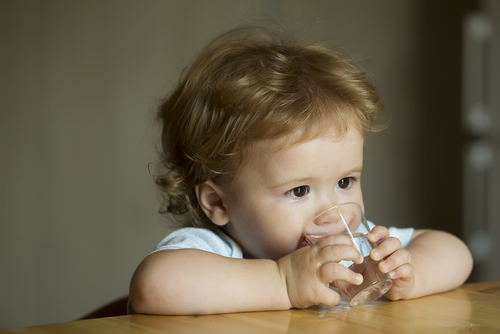
Just like adults, kids need plenty of water to carry out daily functions. As a parent, it can be hard to gauge how much water your child needs to stay properly hydrated. To help you get started, we’ve created a guide to help you learn why water is so important, and how much of it your child needs to drink every day.
Water is one of the most important parts of any child’s diet. It is essential in keeping bowel movements regular and helping to prevent conditions such as urinary tract infections and kidney stones.
Water also allows us to regulate our body temperature. When our bodies heat up—because of a hot day or because of physical activity, for instance—the brain alerts the sweat glands to produce sweat. When children don’t drink enough water, The body cools itself by the evaporation of sweat from the skin. If dehydrated, their bodies can’t sweat enough to stay cool.

At CHOC, we recommend that kids drink the amounts of water below according to their age. It is important to note that children should drink the number of 8-ounce cups of water equal to their age, with a minimum of 64 ounces of water for children over the age of 8. These amounts do not include other beverages they may consume in a day such as milk and juice.
While we recommend using age as the primary criteria for toddlers and younger children, weight can be a helpful metric when determining water intake for older children and teenagers. When it comes to weight, it is a general rule that you should try to drink close to half an ounce of water for each pound you weigh. For example, if your child weighs 125 lbs., they should be drinking close to eight 8-ounce glasses a day, for a total of 64 ounces of water.
Babies should drink only breast milk or formula until they reach six months. After the six-month mark, you can start to give your baby 2-3 ounces of water at a time, in addition to breastmilk or formula. Breastmilk or formula will continue to be their primary drink until they reach the age of twelve months. After that point, you can begin to slowly transition your toddler to water as their primary beverage.
Dehydration occurs when a child loses more fluid than they consume, and their bodies no longer have enough water to carry out normal functions. Dehydration may happen as a result of physical exercise, vomiting, diarrhea, fever, or simply not drinking enough water.
If you are worried that your baby may be dehydrated, please call your pediatrician immediately. The most noticeable signs of dehydration in babies include:
A child will likely not know they are thirsty until they are already dehydrated, so it is important to keep a close eye on them. This is especially true for active children as well as during warmer weather. Signs of dehydration in kids include:
Getting your child to drink enough water can sometimes be a challenge. Here are some fun and creative ways to make sure your child stays hydrated:
Check out more about healthy drink alternatives for your child.
Water, milk and, or milk alternatives should be the staple drinks in your child’s diet. While a little bit of juice or chocolate milk here and there is okay, it is important that the drinks you choose are low in sugar. Beverages that are high in sugar can discourage kids from drinking water and can even make them less hungry for nutritious food. When selecting a beverage for your child, here are some sugary drinks to limit:
According to the NIH, plastic water bottles, although convenient, can release harmful toxins into our water. The chemicals that are most concerning to the experts are phthalates and bisphenol A (BPA). Early studies show that these chemicals may affect the development of children including brain development, hormones, or chemicals that regulate metabolism. The immune system, as well as the reproductive system, may also be affected. To be on the safe side, CHOC recommends parents choose BPA and phthalate-free water bottles for children.
There are many different types of water on the market from tap to expensive artesian water with high levels of alkalinity. Tap water is the most affordable type of water and in most cases, in the United States, tap water is safe for children. Tap water usually includes small levels of fluoride, so take that into consideration when consuming larger volumes of tap water. Some bottled waters are simply filtered tap water and others are sourced from natural springs that contain minerals. All of these forms of water are safe for children in moderation. Water that comes from natural sources and bottled in BPA & phthalate-free plastics are the best choice for children.
Above all, it is important to remember to act as a good role model by demonstrating proper hydration habits for your child. If you suspect your child may be dehydrated, CHOC’s Urology program has dedicated doctors, specialists and treatments just for kids.














CHOC is affiliated with the
UC Irvine School of Medicine